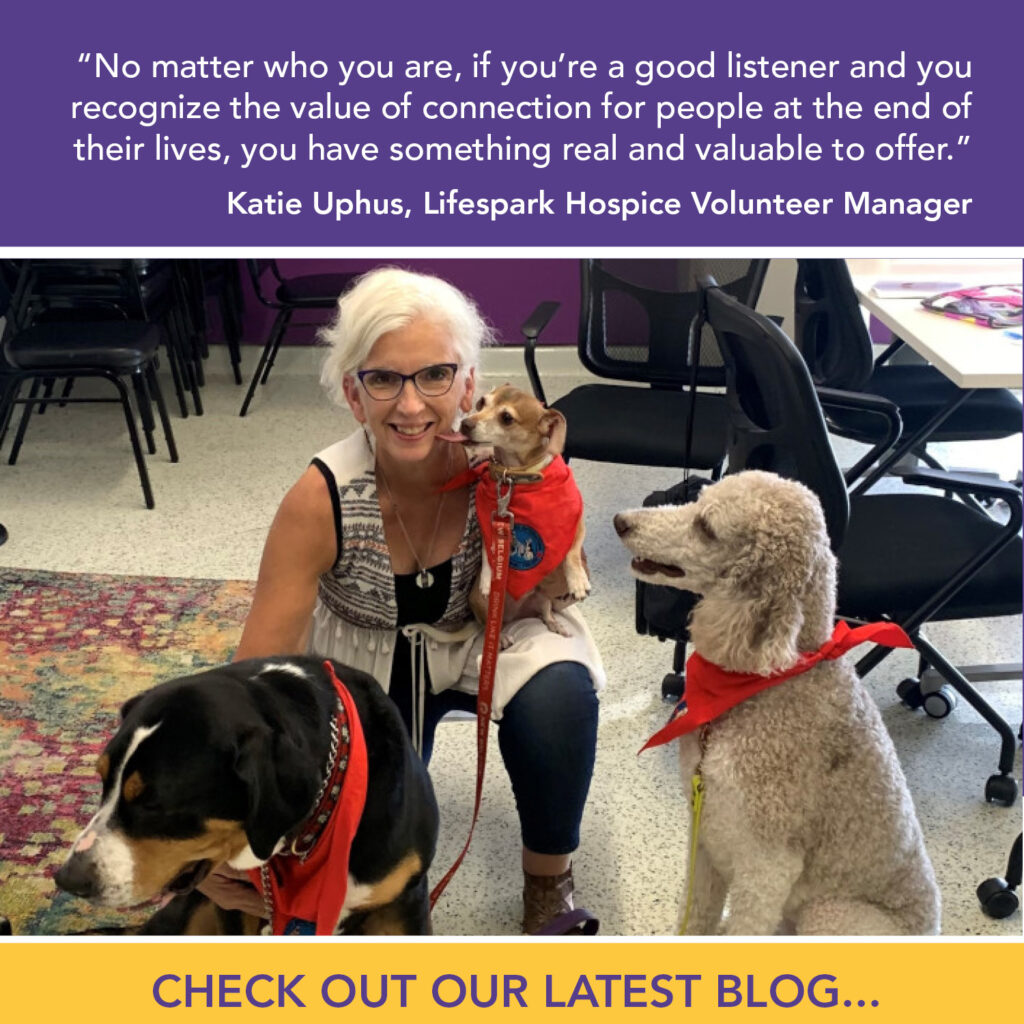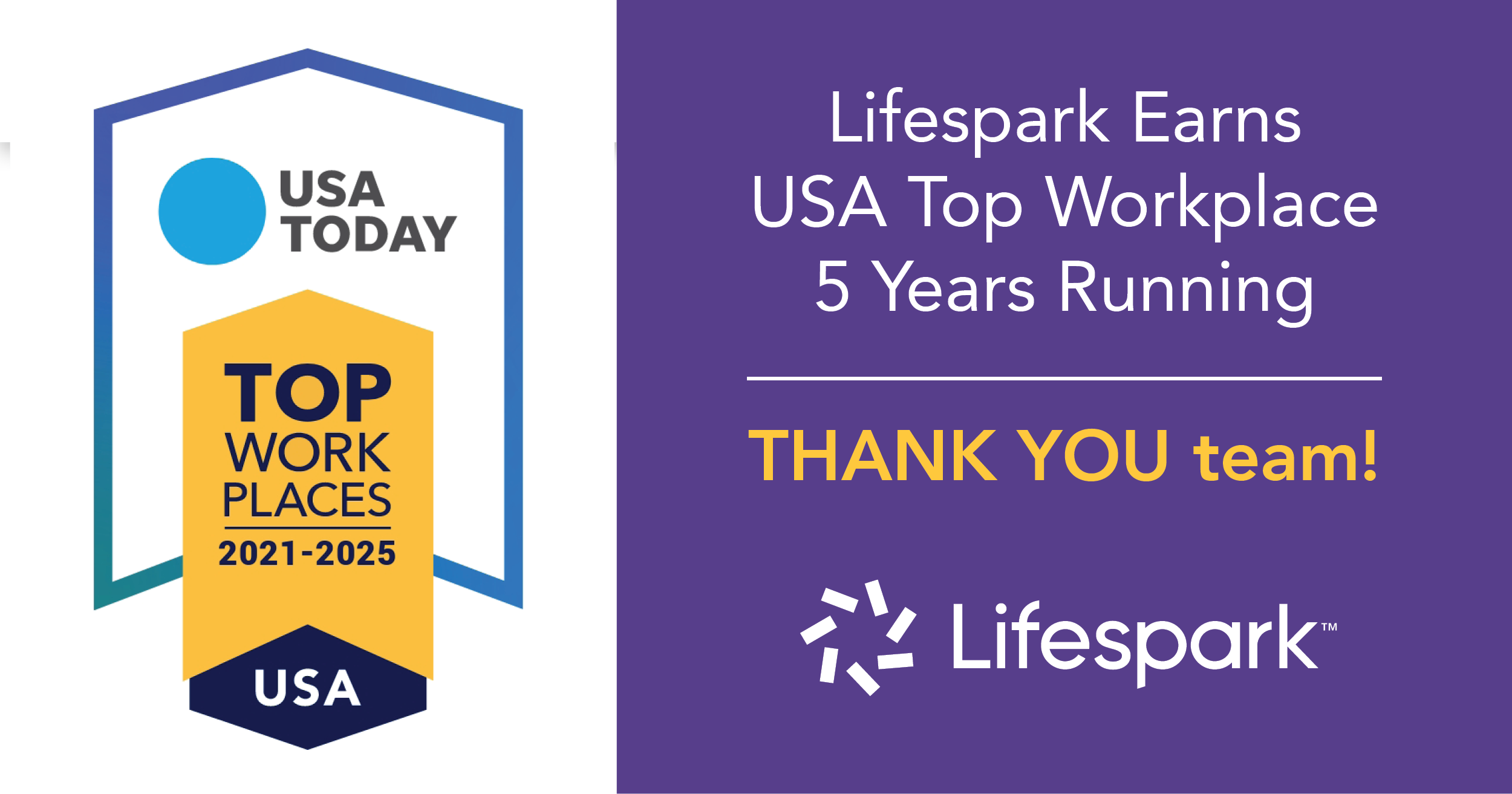
Katie Uphus, Lifespark Hospice Volunteer Manager, is a passionate advocate for hospice volunteering. Before joining Lifespark, she volunteered with several hospice providers and trained as an end-of-life doula, experiences that fueled her desire to help people see end of life as an opportunity for transformation, joy, and connection. Jenny Johnson and Anne Herman are two of the volunteers who work with Lifespark Hospice.
Jenny
After many years of volunteering at her kids’ schools, for their sports teams, and with the Junior Olympics, supporting young people with autism disorder, Jenny Johnson was looking for another way to give back to the community. “Our kids had left home and I had more time on my hands, so when a friend suggested volunteering for hospice, it just felt right,” she said. Although hospice care itself was new to her, she felt she could draw on her experience taking care of her stepfather and her father-in-law as their health declined.
She reached out to Lifespark Hospice and after talking with Katie Uphus, Lifespark Hospice Volunteer Manager, decided to give it a try. As part of the onboarding process, she completed a series of training modules on topics such as HIPAA laws, Alzheimer’s disease, death and dying, and respecting different cultures. She also participated in virtual meetings with hospice staff and volunteers where the team delved into complex issues, like grief and loss, family dynamics, and dementia. Whenever her work schedule allows, she continues to attend those meetings.
“The only thing I was nervous about was whether clients would be wary of a stranger coming into their home,” Jenny said. “In fact, the first person I worked with was initially a little resistant, but she warmed up pretty quickly.” They spent time organizing and decluttering, laughing and reminiscing. According to Katie, Jenny was also a great support to this client’s daughter who also lived in the home. Her client told her nurse.
Because she still works full-time, Jenny limits herself to one client at a time and meets with them in the evening. “Even though I’d be happy just listening to their stories, their pasts, and their histories, I always ask if they have any chores or projects they’d like help with,” she said.
So far, she helped do laundry, wash dishes, unpack moving boxes, organize papers, and declutter. She programmed a Bose speaker so it would play her client’s favorite stations, and when Lifespark gifted one of her clients a trip to the Minnesota Orchestra, Jenny helped her pick out an outfit to wear to the concert. “She hadn’t been able to get out and enjoy the things she used to do, so she was over-the-moon excited about this trip!” Jenny said. “She said to me, you were a stranger and now you’re my friend.”
At first, she worried that building an emotional connection with her clients would make it hard on her when they passed, but she’s found it’s been more of a blessing than a feeling of loss. “The focus is never on the end of life—it’s on their stories and however I can help them in that moment,” Jenny said.
Anne
Throughout her career, Anne Herman had always chosen to work with people who needed extra support—children of family members with terminal cancer, adults in homeless shelters, students at an alternative school for youth with behavioral health issues, as well as stroke survivors and clients in hospice. As her job as a health care compliance and privacy officer became increasingly administrative, she realized she missed the human aspect of health care.
A lifelong lover of dogs, Anne decided to train and certify her dogs through a nationally recognized therapy dog certification program and soon began volunteering for a hospice organization as a pet therapy volunteer while still working full-time.
In 2019, Anne and her husband relocated to the Twin Cities to be closer to family. “It was a challenging transition for me—I went from working 70 hours a week to being retired just as the pandemic shut everything down,” she said. “It was a very isolating time, but it did force me to think about how I wanted to spend my time.”
Once COVID-19 restrictions were lifted, Anne began working as a pet therapy volunteer at a juvenile detention center in Minneapolis and at a law school in St. Paul, two very different environments that shared a need for a calming presence. “One afternoon a week, the dogs and I hang in the lobby and law students stop by to interact with them, which makes the dogs really happy,” she said. “I’ve personally benefited from having dogs in my life, but now there’s a tremendous amount of research showing that this interaction with dogs provides solace, promotes well-being, decreases loneliness, lowers blood pressure, and boosts oxytocin levels, both in people and in the dogs themselves.”
Last fall, she began volunteering with Lifespark Hospice. Like everyone who’s met the dogs, Katie Uphus, Lifespark Hospice Volunteer Manager, adores them and is grateful for Anne’s commitment. “Since September, she’s been driving all over the metro visiting four or more clients a week with her three wonderful therapy dogs, Figaro, Nel and Lux,” she said. “With her deep understanding of dementia, she really tunes into the clients and their connection to the dogs.”
Anne sees the positive effect on clients who are experiencing grief and loss. “I visit a gentleman who had to give up his four beloved chihuahuas when he moved, and although he misses them terribly, my dogs have given him that connection again,” she said. “When he sees us coming, he lights up the room.”
After they leave, he talks about the dogs to staff and other residents and shows off the photos he’s taken of them. “He always tells me, ‘I’m going to be the talk of the dinner table today!’” she said. “I love that the benefits last well beyond our visit.”
How she interacts with clients varies depending largely on the individual’s cognitive status. “My first career out of graduate school was as a speech pathologist, so I have a lot of experience working with older adults with communication problems,” she said.
If a client has difficulty communicating, Anne will spend time sitting quietly with them, one of her dogs at their feet or resting its head on their lap so the client can interact easily with the dog. If a client is feeling agitated and wants to move, she and the dog will either walk with them or she’ll push them in a wheelchair with the dog on their lap. “One of my clients is very limited cognitively and verbally, and although she doesn’t talk to me, she’ll initiate conversations with the dogs,” Anne said.
Like Jenny Johnson, Anne finds purpose in hospice volunteering. “It’s a perfect marriage of my career in health care and my love of dogs,” she said. “This really is the best job ever.”
About hospice volunteering, Katie said, “Volunteers don’t have to come with specialized skills or talents! Anyone who’s a good listener, with a good heart and good boundaries, has something real and valuable to offer as a hospice volunteer. Whether it’s sitting bedside and reading a book, listening to music, playing cribbage, or doing laundry, you can make a real and immediate difference to our clients and their loved ones. Just as important, the simple act of showing up with kindness and working alongside others can also be profoundly enriching for the volunteer.”
To learn more about Lifespark’s Hospice volunteer program, contact Katie Uphus at 952-737-4350 or visit Become A Lifespark Volunteer.



